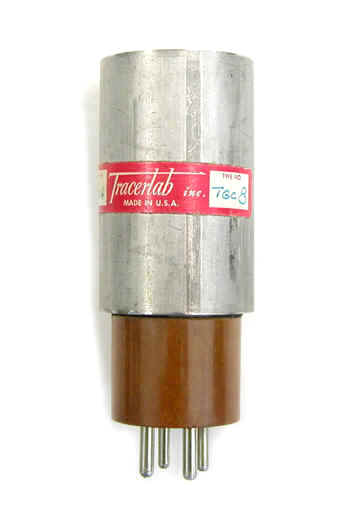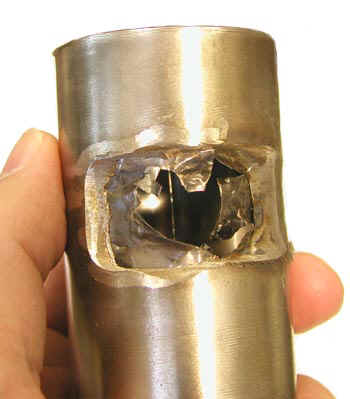Tracerlab TGC-8 GM Tube
The TGC-8, a steel walled GM tube designed for gamma counting, was produced by Tracerlab Inc., of Boston Massachusetts. The earliest reference I have for the TGC-8 is the April 1952 issue of Tracerlog which notes that delivery could be expected in the Fall of 1952. The last reference I have found is 1958. TGC, as might be expected, stands for Tracerlab Geiger Counter.


Tracerlab stated that the cathode employed a large surface area plate and grid structure to maximize the tube’s sensitivity to gamma rays—a large area would increase the potential for gamma ray interactions. Tracerlab did not identify the material that the cathode was manufactured from other than to indicate that it was an alloy and a compromise between a high atomic number and the mechanical properties necessary to construct the plate and grid structure mentioned previously. When I ground open the outer steel wall of a TGC-8 and analyzed the cathode (photo below right), it turned out to be a thin sheet of tantalum. Surprisingly, there was no obvious plate and grid structure, at least in this version of the TGC-8. The tantalum cathode was simply a liner inside the outer steel wall. In the photo, a hole has been torn in the tantalum liner so that the anode can be seen.
When used for measuring I-131 gamma rays, the efficiency of the TGC-8 was said to be five times that of the TGC-1 (an end window GM tube of identical dimensions) and one third greater than a GM tube of the same size using a bismuth cathode.
Size: 3.75” long and 1.5” in diameter
Wall: Stainless steel, > 300 mg/cm²
Anode: Tungsten central wire
Operating voltage: 950 V
Plateau length: 150 volts
Fill gas: Helium with organic quenching agent
Fill gas pressure: 800 mm Hg (The April 1952 issue of Tracerlog indicated 1450 mm Hg)
Dead time: ca. 200 us
Base: Four prong ceramic base
Price: $93.50 in 1952
References
- Nucleonics July 1952, p 83.
- Tracerlab Inc, Catalog E, March 1958.
- Tracerlog No. 43, April 1952.
- Tracerlog No. 45, September 1952.
